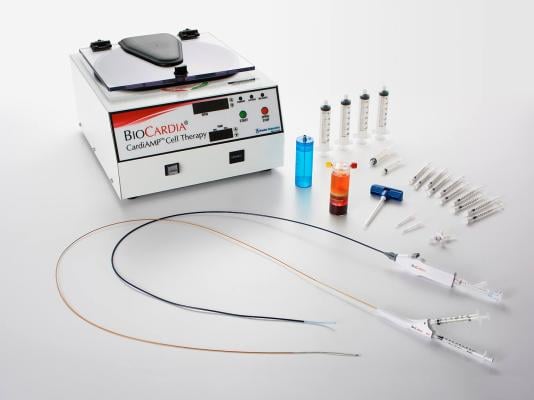
March 13, 2023 — BioCardia, Inc., developer of cellular and cell-derived therapeutics for the treatment of cardiovascular and pulmonary diseases, announced that detailed echocardiography data from the roll-in cohort of the Phase III CardiAMP Cell Therapy Heart Failure Trial is being presented at the American College of Cardiology annual meeting by Peter Johnston, M.D., Assistant Professor of Medicine and Site Principal Investigator at Johns Hopkins University. The echocardiography results from baseline through one and two years showed a more than doubling in the number of heart segments functioning normally and restoration of function to 30 percent of previously non-functioning segments. This data expands upon data previously presented at the Heart Failure Society of America annual meeting last fall.
Dr. Johnston stated, “The substantial improvements in segmental wall motion and overall left ventricular ejection fraction (LVEF) seen at one year continued to improve at two years. This resulted in a median LVEF of 37% at two years as compared to 27% at baseline. While this is an early cohort in the Phase III trial, it is remarkable that the benefits from improved heart function continue to be realized two years after a single treatment of autologous CardiAMP cell therapy.”
Results from the 10-patient roll-in cohort of the clinical trial showed that myocardial wall motion in the 16 regions of the heart was more often characterized as normal after the study treatment at one year follow-up, and at two-year follow-up, as measured by the blinded echocardiography core lab at Yale University:
In this series, only 13 percent of heart segments in these patients were contracting normally before treatment; at one year, 25 percent were contracting normally and at two years, 29 percent were contracting normally– indicating a more than doubling of the number of heart segments characterized as having normal function post-procedure. In completely non-functioning heart segments, 17 of 56, or 30 percent, of those heart segments resumed wall motion by two years.
The overall wall motion score index for all 16 segments in the heart was improved, decreasing from 2.4 at baseline to 2.0 at one year to 1.9 at two years.
As a result of the restoration of myocardial wall motion, patients experienced an improvement in median left ventricular ejection fraction, which increased from 27 percent at baseline to 34 percent at one year, to 37 percent at two years.
In the previously presented data, patient demographics at study start demonstrated characteristics typical of the target population of NYHA class II and III ischemic heart failure patients with reduced ejection fraction. No serious adverse events were observed related to any of the procedures performed. Despite severe, symptomatic ischemic heart failure with reduced ejection fraction (HFrEF), two-year survival was 100 percent, and all patients completed 24 months of follow-up. Changes in guideline-directed medical therapy experienced by these patients were minimal during the two-year study period. These outcomes are consistent with the improvement in functional capacity as measured by median change in six-minute walk distance of +37.5 meters at 12 months and +31 meters at 24 months, and improvement in quality of life as measured by the Minnesota Living with Heart Failure Questionnaire in seven of ten patients at one year and six of ten patients at two years presented previously.
“These early results lend further support to the potential efficacy of the autologous CardiAMP cell therapy and to our mission of restoring heart health,” said BioCardia CEO Peter Altman, PhD. “BioCardia continues to move this clinical trial forward, with recent FDA approval of a supplement designed to add clarity to inclusion criteria for clinical sites in this trial, and submission of an adaptive statistical analysis plan for the trial to the FDA for consideration.”
For more information: www.biocardia.com


 July 31, 2024
July 31, 2024 









